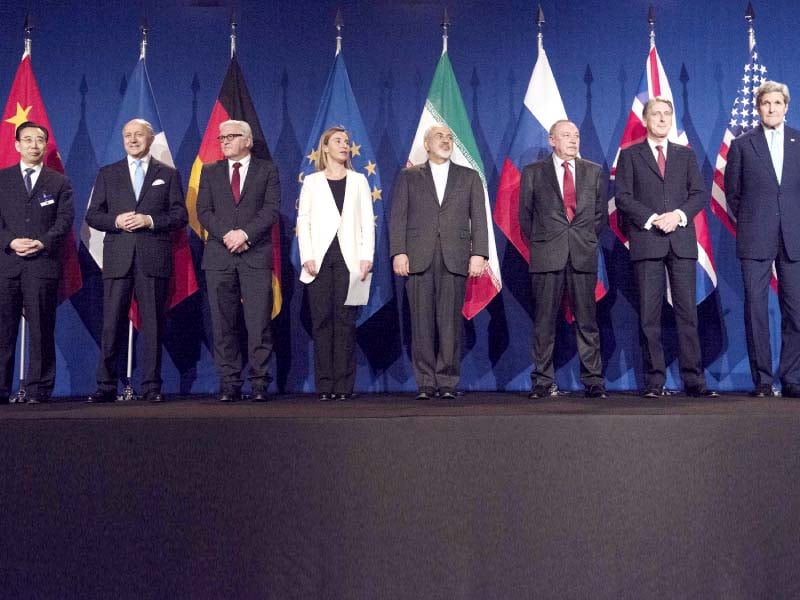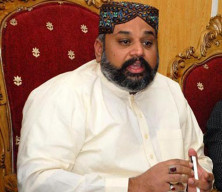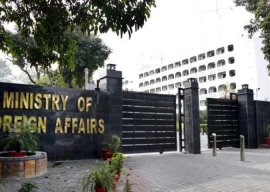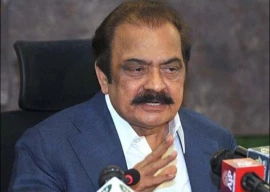
Iran and world powers agreed on Thursday on the framework of a potentially historic deal aimed at curbing Tehran’s nuclear drive after marathon talks in Switzerland.
It marks a major breakthrough in a 12-year standoff between Iran and the West, which has long feared Tehran wants to build a nuclear bomb.
Iran has agreed to curtail its nuclear programme in return for the lifting of punishing sanctions, EU foreign policy chief Federica Mogherini said after eight days of talks. The main outlines agreed Thursday now have to be finalised in a highly complex agreement by June 30.
US Secretary of State John Kerry hailed a ‘big day’ while Iranian President Hassan Rowhani said the drafting of a full agreement would begin immediately with the aim of completing it by the June 30 deadline.
Kerry tweeted that the global powers and Iran “now have parameters to resolve major issues on nuclear program. Back to work soon on a final deal”.
Iranian media said the deal will include Iran slashing by two-thirds, to 6,000 from 19,000, the number of centrifuges, which can make fuel for nuclear power but also the core of a nuclear bomb.
Mogherini, in a joint press statement with Iranian Foreign Minister Mohammad Javad Zarif, also said that the design of a new reactor will be changed so that no weapons-grade plutonium can be produced. The Fordo facility, built deep into a mountain, will remain open but will not be used for enrichment but for research and development.
In return, Mogherini said, nuclear-related US and EU sanctions will be lifted once the UN atomic watchdog has verified that Iran has implemented its promises.
The powers hope that the deal will make it virtually impossible for Iran to make nuclear weapons under the guise of its civilian programme. French Foreign Minister Laurent Fabius said however that there was still work to be done.
US President Barack Obama called the framework agreement on Iran’s nuclear program as ‘a good deal’ that would, if fully implemented, prevent Tehran from obtaining a nuclear weapon and help make the world safer.
The preliminary accord provides a good basis to reach what could be a ‘very good’ comprehensive deal, British Foreign Secretary Philip Hammond said on Thursday. He said a fuller deal that kept to the agreed parameters of the initial agreement would provide reassurance that Tehran’s nuclear programme was peaceful.

In New York, UN Secretary-General Ban Ki-moon said a comprehensive deal between Iran and world powers by June 30 on Tehran’s nuclear programme could “enable all countries to cooperate urgently to deal with the many serious security challenges they face.”
In a statement, Ban congratulated them on reaching a framework agreement on curbing Iran’s nuclear programme for at least a decade that clears the way for talks on a future comprehensive settlement.
Israeli Intelligence Minister Yuval Steinitz, whose country is widely assumed to have the bomb, warned before Thursday’s announcement that the “military option is on the table.” Brigadier General Hossein Dehghan, the Iranian defence minister, said that similar comments Tuesday by Pentagon chief Ashton Carter were “designed to affect the rational atmosphere” of the nuclear talks.
The White House had said overnight that it was prepared to walk away from the talks in Lausanne. Iranian negotiators have been under pressure from domestic hardliners not to give too much away, while also delivering on Rouhani’s promise to win the lifting of sanctions.
Published in The Express Tribune, April 3rd, 2015.

















COMMENTS
Comments are moderated and generally will be posted if they are on-topic and not abusive.
For more information, please see our Comments FAQ